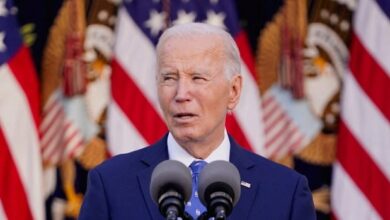Autumn budget live: Rachel Reeves says taxes will rise by £40bn as she delivers budget
Key events
Reeves sets out some of the investment that is now going ahead.
CX onto borrowing to invest. Big numbers
£5bn into housing
£1bn into aerospace
£2bn into automotive sector
£520m for life sciences£2.9bn into defence
£2.3bn into core school budgets
£650m into local transport to improve connections across country— Beth Rigby (@BethRigby) October 30, 2024
She says there will be over £5bn for affordable housing.
And she confirms local authorities will be allowed to keep all the receipts from the sale of council homes.
Move to Persnuffle confirmed
The news that the UK’s fiscal rules will now target Public Sector Net Financial Liabilities, PSNFL, (known as “persnuffle” in economic circles), confirms the Guardian’s report from last week.
It means the UK will now account financial assets, including student loans and company shares, alongside government debts, freeing up potentially £50bn of extra borrowing within the fiscal rules, as this chart shows:
Reeves says she will be left with £15.7bn of headroom at the end of the OBR’s forecast period, under PSNFL.
That’s “much lower than expected”, reports Paul Johnson of the Institute for Fiscal Studies.
Confirm move to target PSNFL – but only £15.7bn of headroom in final year. Much lower than expected
— Paul Johnson (@PJTheEconomist) October 30, 2024
Reeves confirms debt definition is changing, but says four ‘guardrails’ will ensure extra borrowing is responsible
Reeves says, under the Tories, public investment was set to fall from 2.5% of GDP to 1.7% of GDP.
She says her new debt rule – called the investment rule, because the definition of debt is changing to allow more investment – will address this.
She confirms that the government will move to public sector net financial liabilities (PSNFL) as the debt measure. This is a metric that has been measured since 2016, she says.
She says four “guardrails” will be in place.
First, our portfolio of new financial investments will be delivered by expert bodies like the National Wealth Fund, which must, by default, earn a rate of return at least as large as that on gilts.
Second, we will strengthen the role of institutions to improve infrastructure delivery.
Third, we will improve certainty setting capital budgets for five years and extending them at every spending review every two years.
Finally, we will ensure that there is greater transparency for capital spending with robust annual reporting of financial investments based on accounts audited by the National Audit Office and made available to the office for Budget Responsibility at every forecast.
Taken together with our stability rule, these fiscal rules will ensure that our public finances are on a firm footing, while enabling us to invest prudently.
Reeves says, in line with the Barnett formula, there will be an extra £3.4bn for the Scottish government, an extra £1.7bn for the Welsh government and an extra £1.5bn for Northern Ireland.
And the Welsh government is getting £25m to help fund the maintenance of coal tips, she says.
Reeves confirms MoD spending is going up by £2.9bn.
There will be another £2m for Holocaust education, she says.
And there will be an extra £1.3bn for councils, including at least £600m for social care and £230m to to tackle homelessness and rough sleeping.
Reeves announces £1bn increase in special educational needs funding
Reeves says she is tripling investment in breakfast clubs.
And she announces a £1bn uplift in special educational needs funding – an increase of 6% year on year, she says.
Reeves is now talking about spending.
She says day-to-day government spending will rise by 1.5%.
And spending including capital spending will rise by 1.7% in real terms, she says.
At the election, we promised there would be no return to austerity today, we deliver on that promise.
Reeves says freeze in income tax and national insurance thresholds will not be extended, contrary to some pre-budget reports
There was speculation that Reeves would extend the freeze on income tax and national insurance thresholds put in place by the last government. But Reeves has decided not to, she says.
The previous government froze income tax and National Insurance thresholds in 2021 and then they did so again, after the mini budget, extending their threshold freeze for a further two years …
Having considered this issue closely, I have come to the conclusion that extending the threshold freeze would hurt working people would take more money out of their pay slips. I am keeping every single promise on tax that I made in our manifesto. There will be no extension of the freeze in income tax and national insurance thresholds beyond the decisions by the previous government.
From 2028-29, personal tax thresholds will be uprated in line with inflation once again.
Blick Rothenberg, the audit, tax and business advisory firm, point out that Rachel Reeves has announced the largest tax-raising budget in decades.
Simon Gleeson, a partner at Blick Rothenberg, says:
“£40bn in tax raises is the largest any chancellor has made since Norman Lamont in 1993, at £38.5bn (Conservatives), and Dennis Healy at £31.4bn in 1975 (Labour).”
The key measure is tax as a share of the economy:
According to @TheIFS, a £40bn tax rise officially confirms this as the second biggest tax-rising Budget on record – 1.25% of GDP by 2028/9 vs 1.4% in 1991 (h/t @BenZaranko)
*May change depending on projected size of GDP in 2028/9 in new OBR figures. pic.twitter.com/OAoELNBDzY
— Robert Colvile (@rcolvile) October 30, 2024
Reeves confirms VAT on private school fees will go ahead.
Every child should have access to a high-quality education.
From 1 Jan 2025, VAT will apply to all education, training and boarding services provided by private schools.
This money will help us to invest more in state education, improving standards and opportunities for all. pic.twitter.com/bqrZFedyHO
— HM Treasury (@hmtreasury) October 30, 2024
To help high streets, Reeves says there will be 40% relief on business rates for the retail, hospitality and leisure industry in 2025-26, up to a cap of £110,000 per business.
The small business tax multiplier will be frozen next year. And permanently lower tax rates will be introduced for retail, hospitality & leisure properties from 2026-27.
We’re protecting our high streets.
From 2026-27 permanently lower tax rates will be introduced for retail, hospitality & leisure (RHL) properties.
Plus, for 2025-26, 250,000 RHL properties will receive 40% relief on their bills, up to a cash cap of £110,000 per business. pic.twitter.com/OWSplc4YJc
— HM Treasury (@hmtreasury) October 30, 2024
And she says she is cutting the duty on draft alcoholic drinks by 1.7 percentage points.
Reeves says the government is going ahead with the pledge to abolish non-dom status.
Those that make the UK their home should pay their taxes here.
That is why we are removing domicile status from the tax system from 6 April 2025 & creating a simpler residence based regime, designed to bring the best talent & investment to the UK. pic.twitter.com/RXlNkZApUF
— HM Treasury (@hmtreasury) October 30, 2024
Reeves announces 50% increase in air passenger duty for private jets
Reeves turns to air passenger duty.
There will be a small adjustment, worth no more than £2 for economy, short-haul flights.
But there will be a different approach for private jets. Their air passenger duty will rise by 50%, she says.
Making a joke about Rishi Sunak, she says this would be the equivalent of £450 per passenger for a flight to California.
Reeves announces a new tax on vapes.
We want to discourage non-smokers & young people from taking up vaping.
From 1 Oct 2026, we’re introducing a vaping duty for the first time at £2.20 per 10ml of liquid.
Plus a one-off tobacco duty rise to keep the incentive to choose refillable vaping over smoking. pic.twitter.com/yxzOHYlA1E
— HM Treasury (@hmtreasury) October 30, 2024




